turn的详细用法
turn的用法及固定搭配
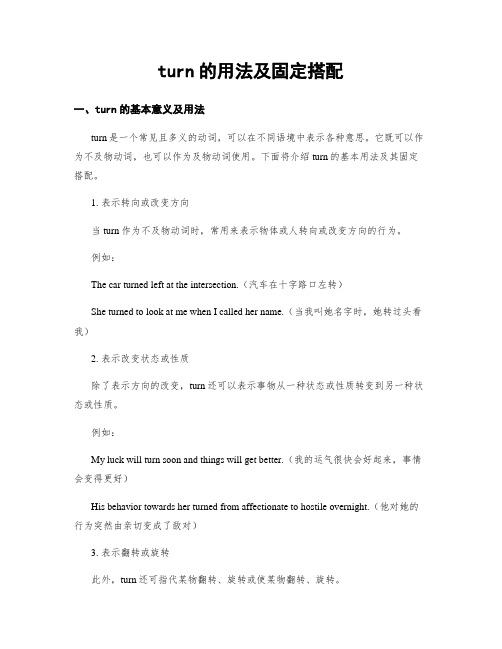
turn的用法及固定搭配一、turn的基本意义及用法turn是一个常见且多义的动词,可以在不同语境中表示各种意思。
它既可以作为不及物动词,也可以作为及物动词使用。
下面将介绍turn的基本用法及其固定搭配。
1. 表示转向或改变方向当turn作为不及物动词时,常用来表示物体或人转向或改变方向的行为。
例如:The car turned left at the intersection.(汽车在十字路口左转)She turned to look at me when I called her name.(当我叫她名字时,她转过头看我)2. 表示改变状态或性质除了表示方向的改变,turn还可以表示事物从一种状态或性质转变到另一种状态或性质。
例如:My luck will turn soon and things will get better.(我的运气很快会好起来,事情会变得更好)His behavior towards her turned from affectionate to hostile overnight.(他对她的行为突然由亲切变成了敌对)3. 表示翻转或旋转此外,turn还可指代某物翻转、旋转或使某物翻转、旋转。
Can you help me quickly turn the mattress over?(你能帮我迅速把床垫翻过来吗?)They took turns spinning the bottle.(他们轮流旋转瓶子)二、turn的固定搭配除了基本用法外,turn还有一些常见的固定搭配,下面将描述其中几个常见的搭配。
1. turn on/offturn on表示打开,启动某设备或系统;turn off则是指关闭或停止使用。
例如:Could you please turn on the TV? I want to watch this show.(你能帮忙打开电视吗?我想看这个节目。
turn的用法总结大全
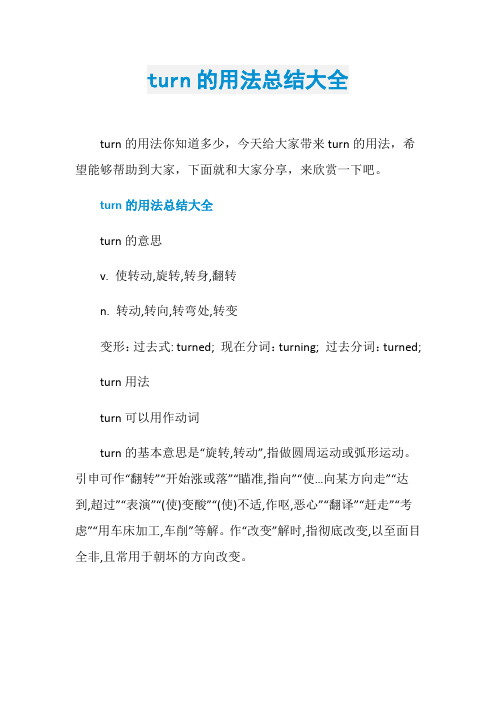
turn的用法总结大全turn的用法你知道多少,今天给大家带来turn的用法,希望能够帮助到大家,下面就和大家分享,来欣赏一下吧。
turn的用法总结大全turn的意思v. 使转动,旋转,转身,翻转n. 转动,转向,转弯处,转变变形:过去式: turned; 现在分词:turning; 过去分词:turned;turn用法turn可以用作动词turn的基本意思是“旋转,转动”,指做圆周运动或弧形运动。
引申可作“翻转”“开始涨或落”“瞄准,指向”“使…向某方向走”“达到,超过”“表演”“(使)变酸”“(使)不适,作呕,恶心”“翻译”“赶走”“考虑”“用车床加工,车削”等解。
作“改变”解时,指彻底改变,以至面目全非,且常用于朝坏的方向改变。
turn可用作及物动词,也可用作不及物动词。
用作及物动词时,可接名词或代词作宾语,也可接以形容词充当补足语的复合宾语。
turn还可用作系动词,意为“成为,变成”,后接名词或形容词作表语,用作表语的名词须用零冠词。
turn用作动词的用法例句The turbulence caused the plane to turn over.空气的激流导致飞机翻转。
Men carried corpses in blankets away from the scene and a dozen others tried to turn over a car with two bodies beneath.搬运工把用毯子盖着的尸体搬离现场,另有十多人试图翻转汽车,搬出下面的两具尸体。
At each turn the screw goes in further.每一次旋转都使螺丝钉更向里进。
turn可以用作名词turn用作名词的基本意思是“转动,旋转”,指使某人或某物转动的行为或某物自己旋转的动作,是可数名词。
turn也可表示“方向的改变,转折,转折点”“转弯处”,引申可作“时间上的转折点,交替时期”解,是可数名词。
turn的用法及短语

turn的用法及短语一、turn 的基本用法Turn 是一个常用的英语动词,有许多不同的用法和短语。
下面将介绍 turn 的基本用法,帮助大家更好地理解和运用该动词。
1. 作为动词,turn 可以表示“转动”,指物体或身体在某个方向上进行移动或改变。
例如:- The car turned the corner swiftly.(汽车迅速转过了拐角。
)- The child turned his head to look at the noise.(孩子转过头去看着声音的来源。
)2. Turn 还可以表示“转变”或“改变”状态或方向。
例如:- After years of hard work, he finally turned his life around.(经过多年的努力,他终于扭转了自己的生活。
)- The weather suddenly turned cold in the evening.(天气在晚上突然变冷了。
)3. 当 turn 后接名词时,常表示“使成为”或“使变得”。
例如:- He turned his hobby into a successful business.(他把自己的爱好发展成了一个成功的事业。
)- She turned her dream into reality through hard work.(她通过努力工作将梦想变成现实。
)4. Turn 还可指某人打开某物、关上某物或调整某物的开启状态。
例如:- Can you please turn off the lights before leaving the room?(你离开房间前能把灯关掉吗?)- I turned on the TV to watch the news.(我打开电视看新闻。
)二、turn 的常用短语除了基本用法外,turn 还有许多常见的短语,下面将介绍其中一些。
1. turn up: 意为“出现”或“到达”。
turn用法讲解
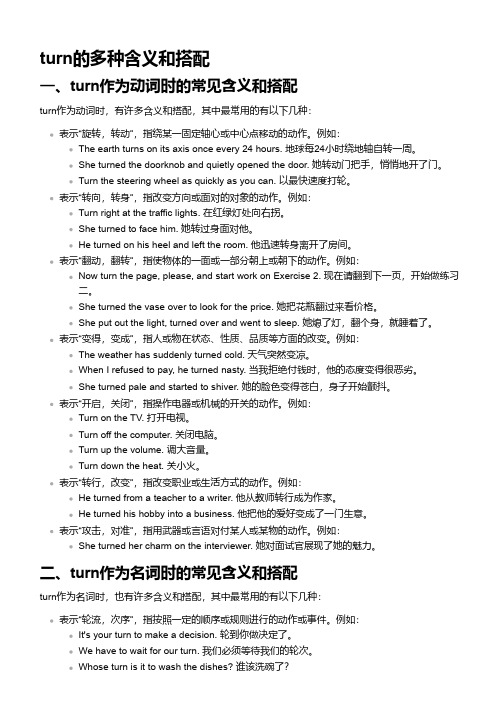
turn的多种含义和搭配一、turn作为动词时的常见含义和搭配turn作为动词时,有许多含义和搭配,其中最常用的有以下几种:表示“旋转,转动”,指绕某一固定轴心或中心点移动的动作。
例如:The earth turns on its axis once every 24 hours. 地球每24小时绕地轴自转一周。
She turned the doorknob and quietly opened the door. 她转动门把手,悄悄地开了门。
Turn the steering wheel as quickly as you can. 以最快速度打轮。
表示“转向,转身”,指改变方向或面对的对象的动作。
例如:Turn right at the traffic lights. 在红绿灯处向右拐。
She turned to face him. 她转过身面对他。
He turned on his heel and left the room. 他迅速转身离开了房间。
表示“翻动,翻转”,指使物体的一面或一部分朝上或朝下的动作。
例如:Now turn the page, please, and start work on Exercise 2. 现在请翻到下一页,开始做练习二。
She turned the vase over to look for the price. 她把花瓶翻过来看价格。
She put out the light, turned over and went to sleep. 她熄了灯,翻个身,就睡着了。
表示“变得,变成”,指人或物在状态、性质、品质等方面的改变。
例如:The weather has suddenly turned cold. 天气突然变凉。
When I refused to pay, he turned nasty. 当我拒绝付钱时,他的态度变得很恶劣。
She turned pale and started to shiver. 她的脸色变得苍白,身子开始颤抖。
turn的用法及固定搭配
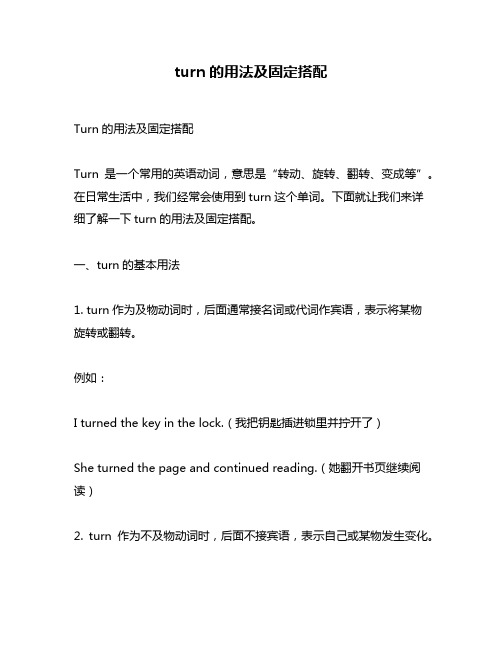
turn的用法及固定搭配Turn的用法及固定搭配Turn是一个常用的英语动词,意思是“转动、旋转、翻转、变成等”。
在日常生活中,我们经常会使用到turn这个单词。
下面就让我们来详细了解一下turn的用法及固定搭配。
一、turn的基本用法1. turn作为及物动词时,后面通常接名词或代词作宾语,表示将某物旋转或翻转。
例如:I turned the key in the lock.(我把钥匙插进锁里并拧开了)She turned the page and continued reading.(她翻开书页继续阅读)2. turn作为不及物动词时,后面不接宾语,表示自己或某物发生变化。
例如:The weather has turned cold.(天气变冷了)He turned pale when he heard the news.(听到这个消息他脸色苍白了)3. turn还可以表示“改变方向”、“前往”等意思。
例如:Turn left at the next intersection.(在下一个十字路口向左拐)He turned to me for help.(他向我求助)4. turn还可以表示“成为”、“变成”的意思。
例如:She has turned into a beautiful young lady. (她已经成为了一位美丽的年轻女子)The caterpillar turned into a butterfly.(毛毛虫变成了蝴蝶)5. turn还可以表示“调整”、“控制”等意思。
例如:Can you turn down the music a little bit?(你能把音乐调小一点吗?)He turned his attention to the new project.(他把注意力转移到了新项目上)6. turn还可以表示“翻译”、“转录”等意思。
例如:Could you please turn this article into English?(你能把这篇文章翻译成英语吗?)She turned his speech into shorthand.(她将他的演讲记录在速记本上)二、turn的固定搭配1. turn around意思是“转过身来”,也可表示“改变方向”。
turn的用法和短语例句
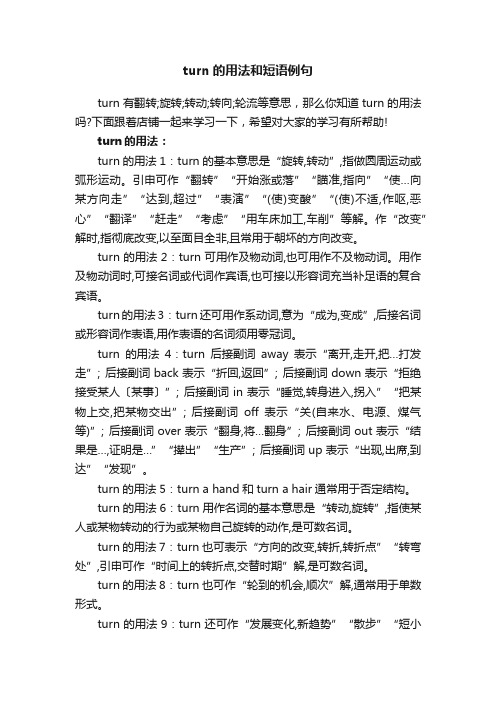
turn的用法和短语例句turn有翻转;旋转;转动;转向;轮流等意思,那么你知道turn的用法吗?下面跟着店铺一起来学习一下,希望对大家的学习有所帮助!turn的用法:turn的用法1:turn的基本意思是“旋转,转动”,指做圆周运动或弧形运动。
引申可作“翻转”“开始涨或落”“瞄准,指向”“使…向某方向走”“达到,超过”“表演”“(使)变酸”“(使)不适,作呕,恶心”“翻译”“赶走”“考虑”“用车床加工,车削”等解。
作“改变”解时,指彻底改变,以至面目全非,且常用于朝坏的方向改变。
turn的用法2:turn可用作及物动词,也可用作不及物动词。
用作及物动词时,可接名词或代词作宾语,也可接以形容词充当补足语的复合宾语。
turn的用法3:turn还可用作系动词,意为“成为,变成”,后接名词或形容词作表语,用作表语的名词须用零冠词。
turn的用法4:turn后接副词away表示“离开,走开,把…打发走”; 后接副词back表示“折回,返回”; 后接副词down表示“拒绝接受某人〔某事〕”; 后接副词in表示“睡觉,转身进入,拐入”“把某物上交,把某物交出”; 后接副词off表示“关(自来水、电源、煤气等)”; 后接副词over表示“翻身,将…翻身”; 后接副词out表示“结果是…,证明是…”“撵出”“生产”; 后接副词up表示“出现,出席,到达”“发现”。
turn的用法5:turn a hand和turn a hair通常用于否定结构。
turn的用法6:turn用作名词的基本意思是“转动,旋转”,指使某人或某物转动的行为或某物自己旋转的动作,是可数名词。
turn的用法7:turn也可表示“方向的改变,转折,转折点”“转弯处”,引申可作“时间上的转折点,交替时期”解,是可数名词。
turn的用法8:turn也可作“轮到的机会,顺次”解,通常用于单数形式。
turn的用法9:turn还可作“发展变化,新趋势”“散步”“短小节目”“风格,性格,性情,习性”等解,是可数名词,常与不定冠词a连用。
turn短语用法总结
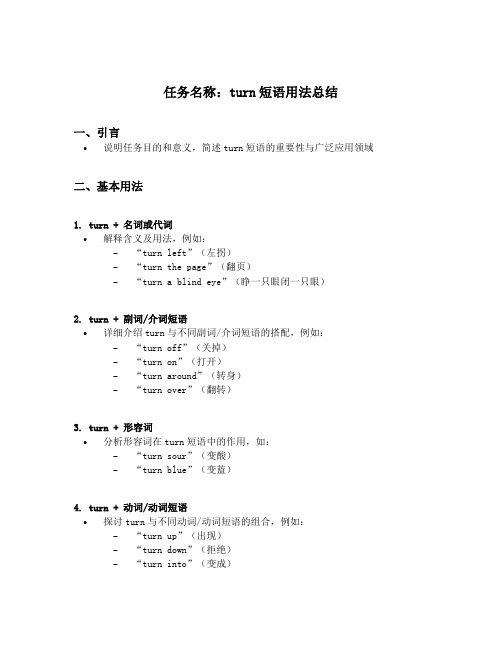
任务名称:turn短语用法总结一、引言•说明任务目的和意义,简述turn短语的重要性与广泛应用领域二、基本用法1. turn + 名词或代词•解释含义及用法,例如:–“turn left”(左拐)–“turn the page”(翻页)–“turn a blind eye”(睁一只眼闭一只眼)2. turn + 副词/介词短语•详细介绍turn与不同副词/介词短语的搭配,例如:–“turn off”(关掉)–“turn on”(打开)–“turn around”(转身)–“turn over”(翻转)3. turn + 形容词•分析形容词在turn短语中的作用,如:–“turn sour”(变酸)–“turn blue”(变蓝)4. turn + 动词/动词短语•探讨turn与不同动词/动词短语的组合,例如:–“turn up”(出现)–“turn down”(拒绝)–“turn into”(变成)三、派生用法1. 句型:turn to + 名词/代词•说明turn to的含义和用法,例如:–“turn to someone for help”(寻求某人的帮助)–“turn to a page”(翻到某一页)2. 句型:turn out + 形容词/副词•解释turn out的意思及其用法,例如:–“turn out well/badly”(最终结果好/糟糕)–“turn out to be true/false”(证明是真实/虚假的)3. 句型:turn someone/something into + 名词•讨论turn into的含义和用法,例如:–“turn a frog into a prince”(将青蛙变成王子)–“turn a house into a home”(把房子变成家)4. 句型:in turn•详细解析in turn的用法及其表示的顺序关系,例如:–“A helps B, and in turn B helps A”(A帮助B,而B反过来也帮助A)四、常见表达•提供一些常见的turn短语表达,如:–“take turns”(轮流)–“the tables have turned”(形势已逆转)–“a turn of events”(情况的转折)五、常见错误与误用•指出一些常见的错误用法和误解,引导正确使用turn短语六、拓展示例•提供更多的例句和语境,加深对turn短语用法的理解七、总结•概括全文内容,强调turn短语的重要性和灵活运用的意义。
turn的用法及固定搭配短语
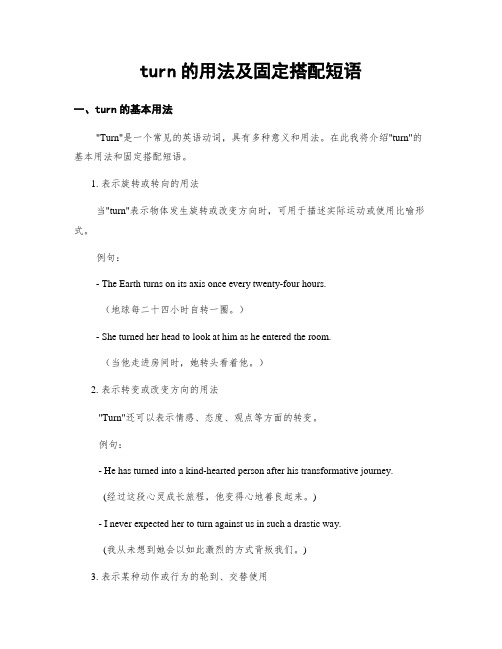
turn的用法及固定搭配短语一、turn的基本用法"Turn"是一个常见的英语动词,具有多种意义和用法。
在此我将介绍"turn"的基本用法和固定搭配短语。
1. 表示旋转或转向的用法当"turn"表示物体发生旋转或改变方向时,可用于描述实际运动或使用比喻形式。
例句:- The Earth turns on its axis once every twenty-four hours.(地球每二十四小时自转一圈。
)- She turned her head to look at him as he entered the room.(当他走进房间时,她转头看着他。
)2. 表示转变或改变方向的用法"Turn"还可以表示情感、态度、观点等方面的转变。
例句:- He has turned into a kind-hearted person after his transformative journey.(经过这段心灵成长旅程,他变得心地善良起来。
)- I never expected her to turn against us in such a drastic way.(我从未想到她会以如此激烈的方式背叛我们。
)3. 表示某种动作或行为的轮到、交替使用当"turn"表示每个人按次序参与某个动作或行为时,常与介词"to"连用。
例句:- It's your turn to cook dinner tonight.(今晚轮到你做晚饭了。
)- The students took turns answering questions in class.(学生们在课堂上轮流回答问题。
)二、turn的固定搭配短语除了基本用法外,"turn"还经常与其他词组成固定搭配,以下是几个常见的例子:1. turn a blind eye (对某事视而不见)表示故意忽视或不理会某事。
turn的用法总结

turn的用法一、turn 用作名词时,意为“轮流"“依次轮流的顺序”。
例如:Now it’s your turn to read the text. 现在轮到你读课文了。
It’s my turn to use the bike。
该轮到我用自行车了。
You must stand in line and wait for your turn. 你必须排队等候.含turn 的短语有:take turns 意为“替换”“轮流”;by turns 意为“轮流地”。
例如: Please take turns to ask questions。
请轮流提问。
We looked after the little boy by turns。
我们轮流照看这个小男孩.We take turns to make dinner。
我们轮流做晚饭。
(=We make dinner by turns。
)注:take one’s turn to do sth。
= do sth。
in turn =do sth。
by turns轮流做某事=take turns to do sth.=take turns at doing sth。
=take turns doing sth.The nurses attended the patient in turn / by turns。
=The nurses took turns to attend the patient。
The twins take turns to make dinner.=The twins take turns at making dinner。
=The twins take turns making dinner。
二、turn 用作系动词时,意为“变得"。
例如:In spring the trees turn green and the flowers start to come out. 春天,树变绿了,花儿开了?In autumn the leaves turn yellow。
turn用法及搭配

turn用法及搭配"Turn" 是一个多义词,可以用作动词、名词或形容词,有多种用法和搭配。
以下是一些常见的用法:作为动词:1. 转动/旋转:- She turned the key in the lock.(她把钥匙在锁里转动。
)2. 改变方向:- Turn left at the traffic light.(在红绿灯处向左转。
)3. 改变状态/情感:- The weather turned cold.(天气变冷了。
)- His mood turned sour.(他的心情变得糟糕。
)4. 变成(某种状态):- Water turns into ice when it freezes.(水在冻结时变成冰。
)5. 翻转:- He turned the page of the book.(他翻开了书的一页。
)6. 使朝向某个方向:- Turn your face to the sun.(把你的脸朝向阳光。
)7. 转变注意力:- Please turn your attention to the screen.(请把注意力转移到屏幕上。
)作为名词:1. 转向:- Take the next turn on the right.(在下一个路口向右转。
)2. 机会/轮到:- It's your turn to speak.(轮到你发言了。
)3. 改变:- There has been a sudden turn of events.(事态突然发生了变化。
)作为形容词:1. 轮流的:- It's a turn-based game.(这是一个轮流进行的游戏。
)2. 曲折的/蜿蜒的:- The road took a sharp turn.(这条路有一个急转弯。
)一些常见的短语和搭配:- turn on/off:打开/关闭(开关电器、灯等)。
- Turn off the lights when you leave.(离开时把灯关掉。
turn 用法
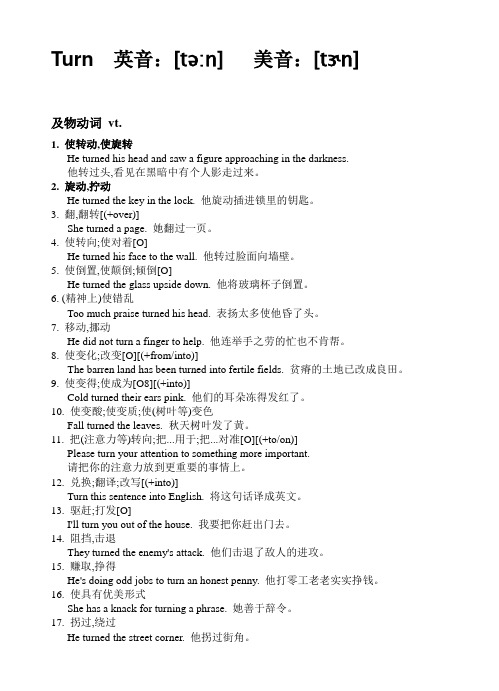
Turn 英音:[tə:n] 美音:[tɝn]及物动词vt.1. 使转动,使旋转He turned his head and saw a figure approaching in the darkness.他转过头,看见在黑暗中有个人影走过来。
2. 旋动,拧动He turned the key in the lock. 他旋动插进锁里的钥匙。
3. 翻,翻转[(+over)]She turned a page. 她翻过一页。
4. 使转向;使对着[O]He turned his face to the wall. 他转过脸面向墙壁。
5. 使倒置,使颠倒;倾倒[O]He turned the glass upside down. 他将玻璃杯子倒置。
6. (精神上)使错乱Too much praise turned his head. 表扬太多使他昏了头。
7. 移动,挪动He did not turn a finger to help. 他连举手之劳的忙也不肯帮。
8. 使变化;改变[O][(+from/into)]The barren land has been turned into fertile fields. 贫瘠的土地已改成良田。
9. 使变得;使成为[O8][(+into)]Cold turned their ears pink. 他们的耳朵冻得发红了。
10. 使变酸;使变质;使(树叶等)变色Fall turned the leaves. 秋天树叶发了黄。
11. 把(注意力等)转向;把...用于;把...对准[O][(+to/on)]Please turn your attention to something more important.请把你的注意力放到更重要的事情上。
12. 兑换;翻译;改写[(+into)]Turn this sentence into English. 将这句话译成英文。
turn 的词源和用法
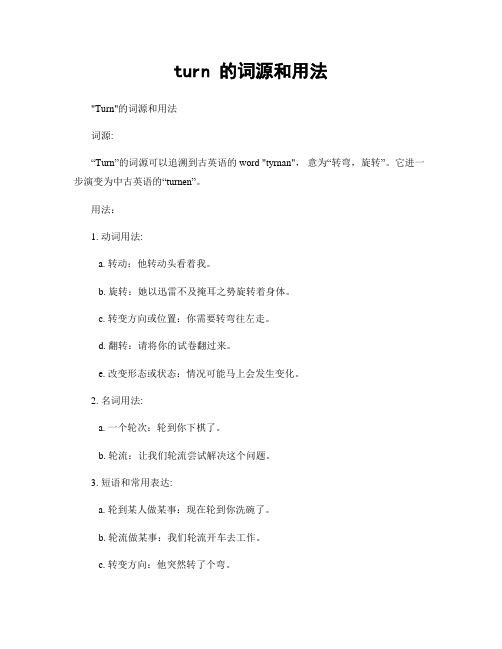
turn 的词源和用法
"Turn"的词源和用法
词源:
“Turn”的词源可以追溯到古英语的word "tyrnan",意为“转弯,旋转”。
它进一步演变为中古英语的“turnen”。
用法:
1. 动词用法:
a. 转动:他转动头看着我。
b. 旋转:她以迅雷不及掩耳之势旋转着身体。
c. 转变方向或位置:你需要转弯往左走。
d. 翻转:请将你的试卷翻过来。
e. 改变形态或状态:情况可能马上会发生变化。
2. 名词用法:
a. 一个轮次:轮到你下棋了。
b. 轮流:让我们轮流尝试解决这个问题。
3. 短语和常用表达:
a. 轮到某人做某事:现在轮到你洗碗了。
b. 轮流做某事:我们轮流开车去工作。
c. 转变方向:他突然转了个弯。
d. 改变主意:她经常变卦。
总结:
“Turn”是一个多功能的动词,可以表示动作的转动、旋转、翻转和转变,也可
以表示名词中的轮次和轮流。
此外,它还作为许多短语和常用表达中的关键词,用来描述转变方向和改变主意的行为。
通过灵活运用"turn",我们可以丰富语言表达,使之更生动形象。
turn的用法和固定搭配示例

turn的用法和固定搭配示例【知识语文团队精选文章】TURN的用法与固定搭配示例专题一:TURN的基本用法1. Turn作为动词,表示“旋转、转动”。
例如:- I turned the key, but the door didn't open.我转动钥匙,但门没有打开。
- The car turned the corner quickly.小汽车迅速转过了拐角。
2. Turn还可以表示“改变方向”。
例如:- Can you turn left at the traffic lights?你能在红绿灯处向左拐吗?- The river turns sharply to the right here.河流在这里急剧转向右边。
3. Turn还可用作“变成、变为”的意思。
例如:- The caterpillar will soon turn into a butterfly.毛毛虫很快会变成蝴蝶。
- His dreams turned into reality.他的梦想成为了现实。
4. Turn用作名词,表示“轮流、机会、次序”等意思。
例如:- It's my turn to speak now.现在轮到我说了。
- As a leader, he had his turn to make decisions.作为领导,轮到他做决定。
专题二:TURN的固定搭配1. Turn a blind eye (to):故意不理睬、视而不见例如:- The police officer turned a blind eye to the illegal parking.警官对非法停车视而不见。
- The teacher turned a blind eye to the studentscheating on the exam.老师对学生在考试中作弊睁一只眼闭一只眼。
2. Turn the tables:扭转局势、转败为胜例如:- Our team turned the tables and won the game.我们的团队扭转了局势,赢得了比赛。
turn的短语用法总结
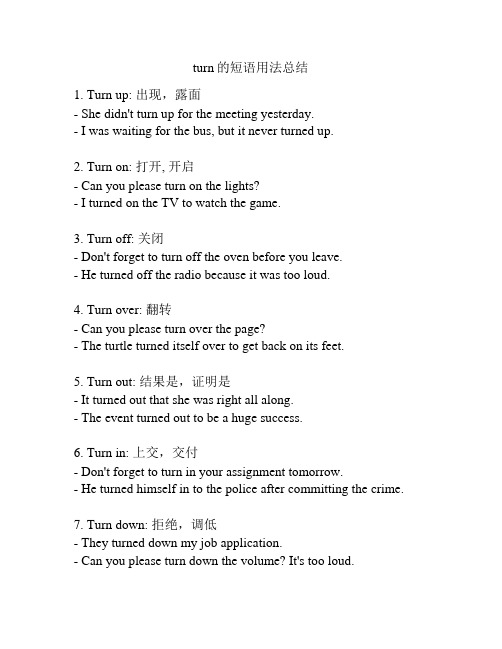
turn的短语用法总结1. Turn up: 出现,露面- She didn't turn up for the meeting yesterday.- I was waiting for the bus, but it never turned up.2. Turn on: 打开, 开启- Can you please turn on the lights?- I turned on the TV to watch the game.3. Turn off: 关闭- Don't forget to turn off the oven before you leave.- He turned off the radio because it was too loud.4. Turn over: 翻转- Can you please turn over the page?- The turtle turned itself over to get back on its feet.5. Turn out: 结果是,证明是- It turned out that she was right all along.- The event turned out to be a huge success.6. Turn in: 上交,交付- Don't forget to turn in your assignment tomorrow.- He turned himself in to the police after committing the crime.7. Turn down: 拒绝,调低- They turned down my job application.- Can you please turn down the volume? It's too loud.8. Turn up: 调高- Can you turn up the heat? It's cold in here.- She turned up the music to dance to her favorite song.9. Turn out: 出席,参加- Many people turned out for the protest march.- He didn't turn out for the party like he said he would.10. Turn away: 拒绝进入,驱逐- The club turned away anyone without a valid ID.- The bouncer turned away the underage kids from entering the bar. 以上是一些常见的turn的短语用法总结。
turn短语用法总结
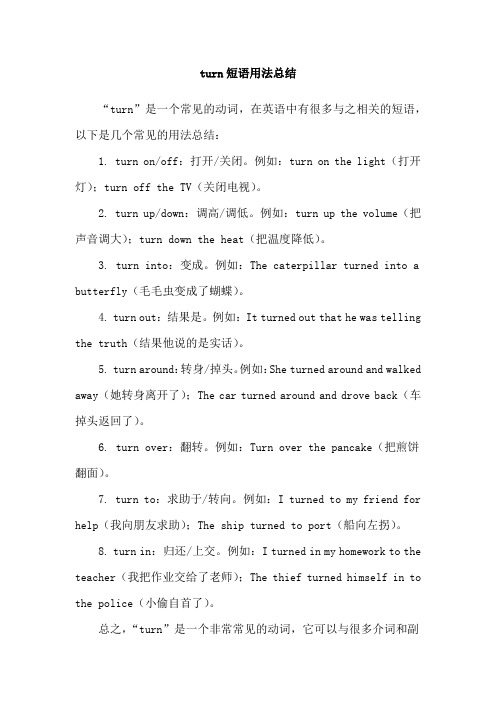
turn短语用法总结“turn”是一个常见的动词,在英语中有很多与之相关的短语,以下是几个常见的用法总结:1. turn on/off:打开/关闭。
例如:turn on the light(打开灯);turn off the TV(关闭电视)。
2. turn up/down:调高/调低。
例如:turn up the volume(把声音调大);turn down the heat(把温度降低)。
3. turn into:变成。
例如:The caterpillar turned into a butterfly(毛毛虫变成了蝴蝶)。
4. turn out:结果是。
例如:It turned out that he was telling the truth(结果他说的是实话)。
5. turn around:转身/掉头。
例如:She turned around and walked away(她转身离开了);The car turned around and drove back(车掉头返回了)。
6. turn over:翻转。
例如:Turn over the pancake(把煎饼翻面)。
7. turn to:求助于/转向。
例如:I turned to my friend for help(我向朋友求助);The ship turned to port(船向左拐)。
8. turn in:归还/上交。
例如:I turned in my homework to the teacher(我把作业交给了老师);The thief turned himself in to the police(小偷自首了)。
总之,“turn”是一个非常常见的动词,它可以与很多介词和副词组成不同的短语,表示不同的意思,需要根据具体语境进行理解。
关于turn的常见短语用法
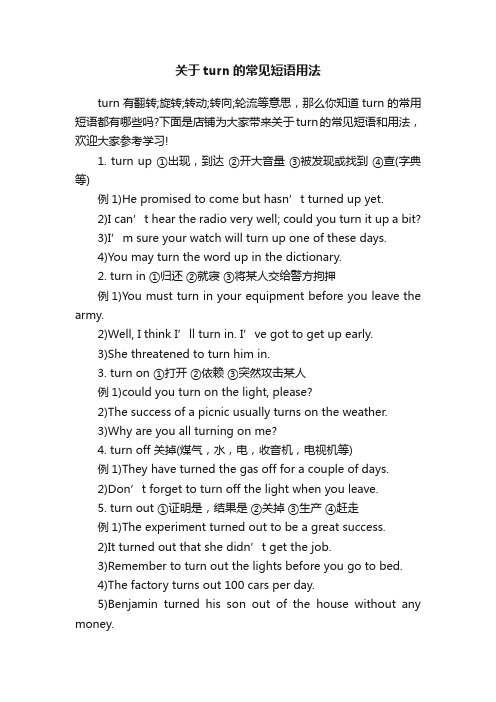
关于turn的常见短语用法turn有翻转;旋转;转动;转向;轮流等意思,那么你知道turn的常用短语都有哪些吗?下面是店铺为大家带来关于turn的常见短语和用法,欢迎大家参考学习!1. turn up ①出现,到达②开大音量③被发现或找到④查(字典等)例1)He promised to come but hasn’t turned up yet.2)I can’t hear the radio very well; could you turn it up a bit?3)I’m sure your watch will turn up one of these days.4)You may turn the word up in the dictionary.2. turn in ①归还②就寝③将某人交给警方拘押例1)You must turn in your equipment before you leave the army.2)Well, I think I’ll turn in. I’ve got to get up early.3)She threatened to turn him in.3. turn on ①打开②依赖③突然攻击某人例1)could you turn on the light, please?2)The success of a picnic usually turns on the weather.3)Why are you all turning on me?4. turn off 关掉(煤气,水,电,收音机,电视机等)例1)They have turned the gas off for a couple of days.2)Don’t forget to turn off the light when you leave.5. turn out ①证明是,结果是②关掉③生产④赶走例1)The experiment turned out to be a great success.2)It turned out that she didn’t get the job.3)Remember to turn out the lights before you go to bed.4)The factory turns out 100 cars per day.5)Benjamin turned his son out of the house without any money.6. turn against 背叛例1)She will never turn against her country.2)She turned against her old friend.7. turn down ①关小②拒绝例1)Can you turn the TV down? I’m trying to get some sleep.2)He tried to join the army but was turned down because of poor health.8. turn into 把……变成,译成例1)You’ll never turn me into a salesman.2)Turn the following sentences into Chinese, please.9. turn to 翻到,求助于例1)Please turn to page10.2)The child turned to its mother for comfort. 3)turn to a dictionary (look up the words in the dictionary)10. turn over ①翻身,翻转②移交,交付例1)She turned over and went to sleep.2)The car turned right over.11. turn (a)round ①绕着……转②面向另一方向例1)The earth turns around / round the sun.2)Turn around / round and let me look at your back.12. turn away ①转过脸,不面对或不再看②拒绝帮助,拒绝某人进入某处例1)She turned away in horror at the sight of so much blood.2)A doctor can’t turn away a dying man.3)Hundreds of people had to be turned away from the stadium.13. turn back 原路返回,往回走例1) The weather became so bad that they had to turn back.2)We were turned back at the border because of the fighting.14. take turns (at) doing sth. / to do sth. 依次,轮流做某事例1)We took turns (at) doing the driving on the way up to Canada.2)You’ll have to take turns being captain of the team.15. in turn ①结果②依次例1)Interest rates were cut, and in turn, share prices rose.2)He asked each of us in turn to describe how alcohol had affected our lives.16. by turns 依次例1)Let’s drive the car by turns.2)We did the work by turns.17. at every turn 经常地,每次例1)I kept meeting him at every turn.turn的用法1:turn的基本意思是“旋转,转动”,指做圆周运动或弧形运动。
- 1、下载文档前请自行甄别文档内容的完整性,平台不提供额外的编辑、内容补充、找答案等附加服务。
- 2、"仅部分预览"的文档,不可在线预览部分如存在完整性等问题,可反馈申请退款(可完整预览的文档不适用该条件!)。
- 3、如文档侵犯您的权益,请联系客服反馈,我们会尽快为您处理(人工客服工作时间:9:00-18:30)。
turn下载纠错下载离线词库以备不时之需英 [tɜːn]美 [tɝn]vt. 转动,使旋转;转弯;翻过来;兑换vi. 转向;转变;转动n. 转弯;变化;(损害或有益于别人的)行为,举动,举止n. (Turn)人名;(德、匈)图恩广告扫地机器人买一送一朗文词典柯林斯词典21世纪词典turn 1/tɜːn,tɝn/ v. S1 W1英 [tɜːn]MEANINGS 义项1.YOUR BODY 人的身体[I,T] to move your body so that you are looking in a different direction转身;转过〔身体〕RELTD TWIST•Ricky turned and walked away. 里基转身走了。
•She turned her head in surprise. 她惊讶地转过头来。
•Brigitte glared at him, turned on her heel (= turned away suddenly because of anger ) , and stomped out of the room. 布丽吉特瞪了他一眼,猛地一转身,噔噔噔地走出了房间。
[+ around/round/away]•Dan turned away, hiding the fear in his eyes. 丹扭过头去,掩饰着眼中的恐惧。
turn (your head/face) to do sth•He turned around to look at Kim. 他转过身看着金。
•‘No,’ she said, turning her head to see David’s reaction. “不。
”她说着,转过头来看看戴维的反应。
2.OBJECT 物体[T usually + adv/prep] to move something so that it is pointing or aiming in a different direction 转动对准turn sth around/over/upside down etc•You m ay turn over your exam papers now. 现在你们可以把考卷翻过来。
turn sth on sth/sb•The firemen turned their hoses on the blaze. 消防队员把水龙带对准熊熊烈火。
turn sth to face sth/sb•Could you turn your chairs to face this way ? 你们把椅子转过来朝着这边好吗?turn a/the page (=move a page in a book over so that you can read the next page)翻页turn sth down/up•He turned down the corner of the sheet to peep at the baby. 他折起被角以便看一眼婴儿。
3.DIRECTION 方向[I,T] to go in a new direction when you are walking, driving etc, or to make the vehicle you are using do this 转弯;(使)改变方向•I watched until he turned the corner . 我看着他,直到他转过街角。
•Turning the car around, we headed home. 我们把车掉了个头,朝家的方向开去。
turn left/right•Turn left at the church. 到了教堂向左拐。
[+ into/onto/down etc]•She cycled up the street and turned into Long Road. 她沿街向前骑去,拐进了朗路。
[I] if a road, river etc turns, it curves and starts to go in a new direction 〔道路、河流等〕转向,转弯•Further on, the river turns east. 再往前,这条河就折向东流。
•The road turns sharply at the top of the hill. 到了山顶道路急转。
4.MOVE AROUND CENTRAL POINT 旋转[I,T] to move around a central or fixed point, or to make something move in this way(使)旋转,(使)转圈•The wheels turned slowly, then picked up speed. 轮子慢慢转动,然后开始加速。
•For some reason, the key wouldn’t turn. 不知为什么,钥匙转不动。
turn the handle/knob/key/tap etc•She gently turned the handle of the bedroom door. 她轻轻转动卧室门上的把手。
5.CHANGE 改变[linking verb, T,连系动词] to start to have a different quality, or to make something do this(使)变成,(使)变为THESAURUSBECOMEturn (sth) red/blue/white etc•Rose’s hair was already turning grey. 罗丝的头发已经开始花白了。
•In October the leaves turn orange and yellow. 到了10月份,树叶有的变成了橘红色,有的变成了黄色。
•The sun had turned the sky a glowing pink. 太阳把天空染得一片绯红。
the weather turns cold/nasty etc•Then it turned co ld and started to rain. 然后天气变冷,开始下雨。
turn nasty/mean/violent etc (=suddenly become angry, violent etc)变得恶毒/小气/凶暴等•The police are worried that the situation could turn violent. 警方担心这一局势可能会演变成暴力。
6.ATTENTION/THOUGHTS 注意/想法[I,T] to start to think about, deal with, look at etc a particular person, thing, or subject, instead of what you were thinking about etc before转移〔思考、处理、观察等的对象〕•Phil turned his gaze towards the older man. 菲尔把目光转向那个较年长的男子。
•Now is the time of year when thoughts turn in the direc tion of summer holidays. 现在又到大家考虑夏季度假的时候了。
•Next the Senator turned to education. 接着参议员谈起了教育。
turn your attention/thoughts/efforts etc to sth/sb•Many investors have turned their attention to opportunities abroad. 很多投资者把注意力转向了国外的机会。
turn to/towards etc sth•As usual, the conversation turned back to her children. 同往常一样,谈话的内容又回到她的孩子身上了。
7.turn your back (on sb/sth)to refuse to help, support, or be involved with someone or something 对(某人/某事)置之不理,对(某人/某事)撒手不管•How can you turn your back on your o wn mother? 你怎么可以对自己的母亲不闻不问呢?•In his twenties he turned his back on his Catholic faith. 他二十几岁时背弃了天主教的信仰。
to turn so that your back is pointing towards someone or something, and you are not looking at them 转身背对〔某人或某物〕•Angrily, she turned her back on hi m. 她生气地转过身背对着他。
8.AGE/TIME 年龄/时间[T] to become a particular age, or to reach a particular time到〔某年龄或某个时间〕sb turns 15/20/40 etc•My son’s just turned 18. 我的儿子刚满18岁。
it’s turned 2 o’clock/5/midday etc•It’s just turned three. 现在刚到3点。
9.turn sth inside outto pull a piece of clothing, bag etc so that the inside is facing out 把〔衣服、包等〕里朝外翻•Turn the sweater inside out before you wash it. 把毛衣翻过面来洗。
to search everywhere for something, in a way that makes a place very untidy 到处寻找某物,把某物翻个底朝天•Thieves had turned the house upside down. 小偷把房子翻了个底朝天。
to completely change the way that something is done, organized, thought about etc 彻底改变•New approaches to marketing turn old practices upside down. 新的营销方式彻底改变了以前的做法。
